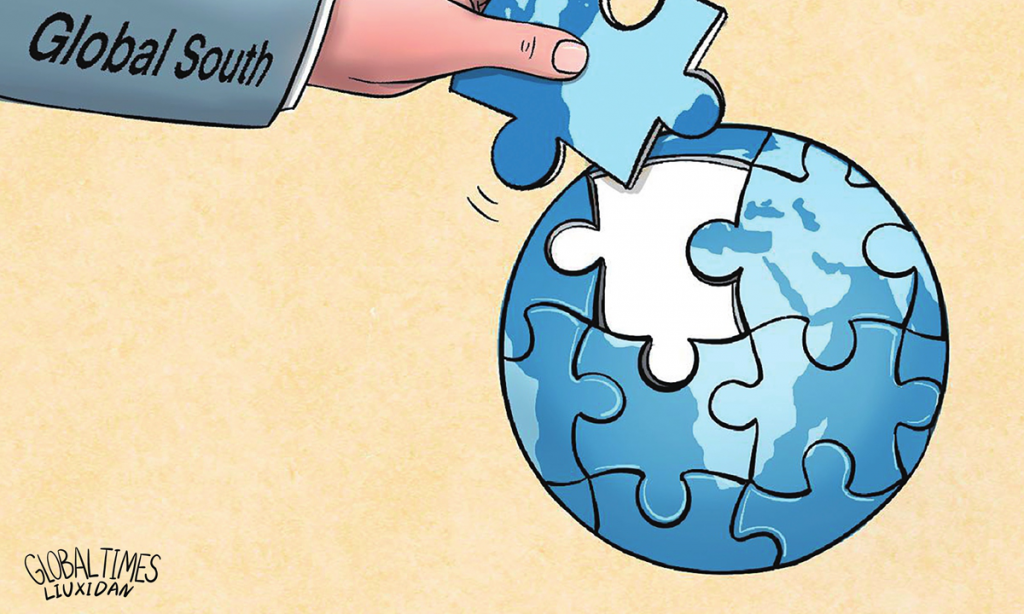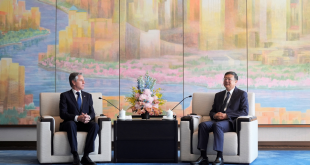ByMa Hanzhi
Published:March 28,2024
Illustration:Liu Xidan

The rapid development of the Global South is having a significant impact on the world economic and political landscape. Propelling indigenous development and accelerating economic modernization remain crucial tasks faced by the developing countries in the Global South, so it is of great importance for the countries to strengthen exchanges and mutual learning of development ideas.
The 13th Meeting of the China-Africa Think Tanks Forum held in Tanzania’s port city of Dar es Salaam recently reached a consensus on “deepening global development cooperation,” emphasizing dialogue rather than conflicts among civilizations, and supporting countries in pursuing modernization that are in line with their own development requirements and national conditions.
The deepening cooperation in development among members of the “Global South,” represented by China and African countries, is, to a large extent, the inevitable result of the long-term failure of the US and Western countries’ promoting the “Neoliberalism model” in the non-Western world. This holds significant importance for China, Africa, and other developing countries in breaking the misconception that “modernization equals Westernization.”
The “neoliberal” reforms led and promoted by the West in the 1980s had a disastrous impact on Africa. At that time, a comprehensive liberalization trend led by former British Prime Minister Margaret Thatcher and former US President Ronald Reagan gained momentum. The subsequent push of the “Washington Consensus” further deepened the understanding of countries like the UK and the US on the so-called neoliberalism triumphing over government intervention, making it gradually become a mainstream economic trend and policy paradigm.
The economic crisis that began in Africa in the 1970s provided an opportunity for Western intervention in African development. They prescribed a structural adjustment plan for Africa, with marketization, privatization, and liberalization of capital as the main component. “Neoliberalism” gradually transitioned from a theoretical concept to a policy framework in Africa.
However, during the period from 1980 to 1997, the GDP of countries in sub-Saharan Africa declined by an average of 1 percent per year. At the same time, the structural adjustment under the “neoliberal” paradigm led to heavy debts burdening Africa, and the share of African countries in global trade continued to decrease.
The current new round of “neoliberal” reforms is putting Africa in a new predicament. Under the impact of the 2008 international financial crisis, the 2014-2015 global commodity price fluctuations, the COVID-19 pandemic, and the interest rate hikes in major Western economies, some African countries are deeply mired in economic difficulties.
In order to obtain loans from international financial institutions dominated by the West, and to accelerate the introduction of foreign capital, African economies, including major countries such as Nigeria, Egypt, Angola, and Ethiopia, have accelerated privatization and market-oriented reforms with a “neoliberal” color, involving a wide range of important areas such as agriculture, electricity, energy and mineral resources, infrastructure, transportation, and finance.
However, most of the reforms have not led to a significant improvement in the economic situation, and some countries have been forced to cancel their “neoliberal” reform plans, which mainly focus on privatization.
This fully reflects that the long-term implementation of “neoliberal” policies pushed by the West has not only failed to bring development to Africa, but has also driven the African economy more fragile and people’s lives more difficult.
In order to create a favorable environment in Africa, demanded by the West, the functions of economic and financial governance by some African governments have been significantly reduced, leading to these countries being “captured” to a certain extent by international capital, unable to provide basic support and protection for the healthy operation of the market. The final result is that international monopoly capital, especially American and European capital, through various legal and illegal means, has extensively encroached on the development of Africa.
Represented by the Dar es Salaam Consensus, China and Africa are exploring common solutions to major challenges facing the Global South and the world, transcending the Washington Consensus and the ideology.
The Dar es Salaam Consensus promotes the common values of all humanity in terms of values, transcending the arrogant behavior of the West trying to monopolize the discourse of human development and cultural exchange with the so-called Western universal values.
In terms of core concepts, it emphasizes cooperation and mutual development, transcending the Western practice of prioritizing their own interests and locking other countries into the lower end of the industrial and supply chains, promoting only their own growth and preventing others from developing, in a mind-set of exclusive gains.
In terms of global governance, advocating for orderly, equal multi-polarization and inclusive globalization that represents the interests and demands of the vast majority of people in the world – helping transcend the “pseudo-globalization” of the US.
For economic theory, it goes beyond the internationally recognized path different from the “Washington Consensus,” transcending the practices of advocating “neoliberalism” and “shock therapy” from the West, to politicizing and securitizing economic and trade cooperation.
In terms of ideology, it emphasizes putting people at the front and center, protecting the rights of economic development for emerging economies, and reclaiming the core values of development, transcending the logic and practice of the US using “democracy, freedom, human rights” as tools of hegemony.
In the way of proposing consensus, it is also based on the principles of consultation, construction, and sharing between China and Africa, reflecting true sovereignty equality and mutual respect, surpassing the American academic community’s tendency to use Latin America as a “springboard” to promote American ideas and doctrines.
It can be foreseen that every small step of exploration beyond the “neoliberalism” of the West in China-Africa cooperation will inspire and drive the countries of the “Global South” to take greater strides in pursuing intellectual independence and economic modernization.
The author is a scholar at Department for Developing Countries Studies, China Institute of International Studies. bizopinion@globaltimes.com.cn
Global Times
 Africa -China Review Africa -China Cooperation and Transformation
Africa -China Review Africa -China Cooperation and Transformation
